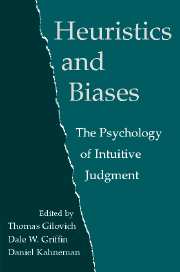Book contents
- Frontmatter
- Contents
- List of Contributors
- Preface
- Introduction – Heuristics and Biases: Then and Now
- PART ONE THEORETICAL AND EMPIRICAL EXTENSIONS
- PART TWO NEW THEORETICAL DIRECTIONS
- PART THREE REAL-WORLD APPLICATIONS
- 33 The Hot Hand in Basketball: On the Misperception of Random Sequences
- 34 Like Goes with Like: The Role of Representativeness in Erroneous and Pseudo-Scientific Beliefs
- 35 When Less Is More: Counterfactual Thinking and Satisfaction among Olympic Medalists
- 36 Understanding Misunderstanding: Social Psychological Perspectives
- 37 Assessing Uncertainty in Physical Constants
- 38 Do Analysts Overreact?
- 39 The Calibration of Expert Judgment: Heuristics and Biases Beyond the Laboratory
- 40 Clinical versus Actuarial Judgment
- 41 Heuristics and Biases in Application
- 42 Theory-Driven Reasoning about Plausible Pasts and Probable Futures in World Politics
- References
- Index
38 - Do Analysts Overreact?
from PART THREE - REAL-WORLD APPLICATIONS
Published online by Cambridge University Press: 05 June 2012
- Frontmatter
- Contents
- List of Contributors
- Preface
- Introduction – Heuristics and Biases: Then and Now
- PART ONE THEORETICAL AND EMPIRICAL EXTENSIONS
- PART TWO NEW THEORETICAL DIRECTIONS
- PART THREE REAL-WORLD APPLICATIONS
- 33 The Hot Hand in Basketball: On the Misperception of Random Sequences
- 34 Like Goes with Like: The Role of Representativeness in Erroneous and Pseudo-Scientific Beliefs
- 35 When Less Is More: Counterfactual Thinking and Satisfaction among Olympic Medalists
- 36 Understanding Misunderstanding: Social Psychological Perspectives
- 37 Assessing Uncertainty in Physical Constants
- 38 Do Analysts Overreact?
- 39 The Calibration of Expert Judgment: Heuristics and Biases Beyond the Laboratory
- 40 Clinical versus Actuarial Judgment
- 41 Heuristics and Biases in Application
- 42 Theory-Driven Reasoning about Plausible Pasts and Probable Futures in World Politics
- References
- Index
Summary
It has long been part of the conventional wisdom on Wall Street that financial markets overreact. Both casual observation and academic research support irrational exuberance (Shiller, 2000). For instance, Shiller's survey evidence relating to the 1987 stock market crash reveals that investors were reacting to each other's behavior rather than to hard economic news.
In prior research, we argued that mean reversion in stock prices is evidence of overreaction. In our 1985 paper, we showed that stocks that were extreme losers over an initial 3to 5-year period earned excess returns over subsequent years. In the 1987 paper, we showed that these excess returns could not easily be attributed to changes in risk, tax effects, or the small firm anomaly. Rather, we argued that the excess returns to losers might be explained by biased expectations of future earnings. We found that the earnings for losing firms had fallen precipitously while their share prices were lagging market performance, but then rebounded strongly over the next few years. Perhaps, we speculated, “the market” did not correctly anticipate this reversal in earnings. This hypothesis, of excessive pessimism about the future prospects of companies that had done poorly, was suggested by the work of Kahneman and Tversky (1973). They found that people's intuitive forecasts have a tendency to overweight salient information such as recent news, and underweight less salient data such as long-term averages.
- Type
- Chapter
- Information
- Heuristics and BiasesThe Psychology of Intuitive Judgment, pp. 678 - 685Publisher: Cambridge University PressPrint publication year: 2002
- 75
- Cited by



